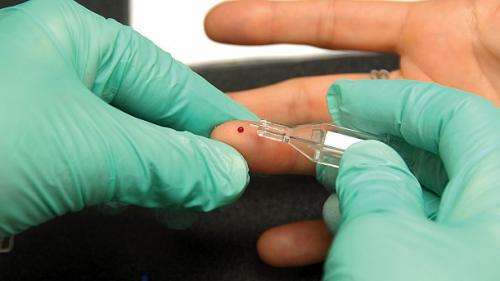Hormone action likely culprit of hypoglycemia after gastric bypass surgery

(Medical Xpress)—Researchers at the University of Cincinnati (UC) have discovered that blocking the action of one of the gut hormones can correct post-meal hypoglycemia (low blood sugar) in gastric bypass patients.
These findings, which are featured in the March 2014 edition of the journal Gastroenterology, are part of an ongoing effort by UC researchers to better understand glucose metabolism after weight-loss surgeries and the physiological factors leading to improvement of hyperglycemia in majority of patients with Type 2 diabetes as well as glucose abnormalities in the individuals who suffer from low sugar syndrome after gastric bypass surgery.
"Over the years we have recognized that gastric bypass is very effective for treatment of obesity and and has an immediate and robust effect on glucose improvement in patients with Type 2 diabetes. However, there is a subgroup of patients where gastric bypass surgery creates a situation of hypoglycemia, associated with too much of insulin secretion after meal ingestion, several years after surgery," says Marzieh Salehi, MD, associate professor in the division of endocrinology, metabolism and diabetes, UC Health physician and lead investigator.
"It's a common story … we get calls from all over the country from people asking for help," she says, adding that symptoms of hyperinsulinemic hypoglycemia in bypass patients often overlap with "dumping" syndrome, a common aftereffect of bypass surgery, therefore, diagnosis of glucose abnormalities after surgery remains to be a challenge.
"Patients with hyperinsulinemic hypoglycemic have excessive insulin production in response to eating," she says, explaining that the symptoms of hypoglycemia can start out slowly with post-meal dizziness, sweating, fast heart beats, tingling and fatigue, which generally get better immediately by taking carbohydrates.
Over time, Salehi says, the condition progress and could cause symptoms consistent with cognitive impairment. Patients "just pass out with no warning," she says.
Funded by a grant from the National Institutes of Health, this study focused specifically on blocking the gut hormone Glucagon-like Peptide 1 (GLP-1), which is enhanced after gastric bypass surgery.
Twenty-four subjects were recruited for the study: nine with recurrent hypoglycemia after gastric bypass, seven with no symptoms of hypoglycemia after gastric bypass and eight healthy control subjects. All underwent a mixed meal tolerance test and with and without use of GLP-1 blocker.
The result, Salehi says, is that post-meal blood sugar levels were corrected in all patients and this effect was mediated by lowering insulin secretion in affected subjects.
This study has implications for treatment of hyperinsulinemia hypoglycemia after gastric bypass as well as better understanding of mechanisms by which this surgery alters glucose metabolism in general. At this point there is no specific therapeutic option available for patients with this condition beyond dietary modification.
According to Salehi, gastric bypass is the most commonly performed bariatric surgery (60 to 80 percent) in the U.S. It is estimated that more than 700,000 persons in the U.S. have undergone gastric bypass over the last decade based on an estimated 110,000 bariatric procedures per year since 2003.
















